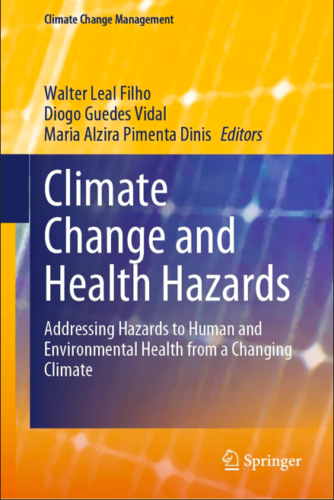A recent publication tackling the intersection of climate change and health, developed by members of the NeuroLandscape team, has been released in the book Climate Change and Health Hazards: Addressing Hazards to Human and Environmental Health from a Changing Climate, edited by Walter Leal Filho, Diogo Guedes Vidal, and Maria Alzira Pimenta Dinis. The chapter, titled “Climate Change and Mental Health in Bangladesh: A Cultural Variability Perspective,” written by Nazwa Tahsin, Weronika Z. Gasior, and Agnieszka Olszewska-Guizzo, focuses on Bangladesh, a country often listed among those most at risk of climate threat (Hossain, 2022).

The chapter presents a fresh perspective on mental health in Bangladesh, with a close eye on how climate change and adaptation intersects with cultural, linguistic, religious, and gender-related dimensions.
At NeuroLandscape, we are particularly interested in the gendered dimensions of climate change, an area of reseach that remains significantly under-explored, despite increasing evidence of its significance. For instance, women make up 80% of those displaced by climate change globally. They also play a key role in natural resource management and community resilience.
Therefore, empowering women is not only an effort towards gender equality but is also essential for sustainable climate adaptation and mitigation efforts.
Climate change is not gender neutral
Bengal shoulders a complex gender history. According to various written documentation, the precolonial era recognised a diversity of genders and non-binary identities. However, colonial-era policies adopted a more conservative approach to gender, influenced heavily by conservative Christian doctrine. Instead, the favour was given to a more rigid gender binary system that not only marginalized women and non-binary individuals but affected their livelihood, human rights and overall well-being. Laws such as Section 377 penalised intersex, transgender (hijra), and gay (kothi) communities, leading to widespread social ostracism, suppression of rights, and even the discontinuation of their documentation (Khan, 2021).
Since its independence, Bangladesh has made notable progress in promoting gender equity and community recognition in terms of economic and educational reform. The country now holds top positions in the South Asia region for various gender indices (WEF, 2021). Nevertheless, traditional gender roles remain deeply rooted in the patriarchal social fabric. Women and girls continue to be disproportionately affected by poverty and climate-related challenges such as land erosion or salinity intrusion. These factors perpetuate child marriages in rural areas, expose young girls to an increased risk of malnutrition, domestic violence, and early pregnancies, all of which contributes significantly to mental health issues.
According to a recent study, adult women in Bangladesh show a higher suicide rate than men (WHO, 2021). Another study revealed women are almost twice as likely to die from mental illnesses such as depression (1.13%) compared to men (0.6%) (BBS, 2021a). This, in turn, creates a cascading effect on the family as a whole. The extended family may be shunned by the community because of their association to a family member with a mental illness (WHO, 2021).
The face of mental health
A national survey conducted between 2018–2019 found that 92.3% of persons with diagnosable mental health disorders in Bangladesh were not receiving treatment (WHO, 2021). The rates of depression, anxiety, and suicide remain exceedingly high (Naveed et al. 2020). The ongoing climate crisis places greater burden on these struggles, contributing to further PTSD, stress, sleep disorders related to natural disasters and, in some cases, “ecological grief” in recurring climate hardships (Hayward and Ayeb-Karlsson 2021).
Unfortunately, public health institutions in Bangladesh receive limited funding to cater for the population equitably and mental health services are not a sector that is covered. Instead, the mental health facilities in the country are private bodies and require out-of-pocket expenditure from their patients. This, together with the already mentioned social stigma around mental health diagnosis, reveals a healthcare sector that does not encourage seeking professional care.

Addressing gendered impact of climate change and mental health in Bangladesh is an important step in understanding the phenomenon and taking appropriate actions. This whole volume offers a wealth of perspectives and propositions on how to tackle climate change and health hazards, including the importance of mental health and gender equality. As the authors of this chapter argue:
“In the face of what appears to be an imminent climate crisis, for Bangladesh, addressing economic stability in the long run, gender equality and the provision of mental health services should be the key aspects to increase the well-being and mental health of the population. However, these actions must consider the unique social, cultural, religious, ethnic and linguistic dimensions of the Bangladeshi people and their land. Embracing the rich and diverse culture may be just what the country needs to really impel towards improved well-being and happiness, despite the risks of climate change it will inevitably face in the future.”
Reference List
BBS (2021a) Report on Bangladesh sample vital statistics 2020, Ministry of Planning, Government
of the People’s Republic of Bangladesh http://bbs.portal.gov.bd/sites/default/files/files/bbs.por
tal.gov.bd/page/b343a8b4_956b_45ca_872f_4cf9b2f1a6e0/2021-06-28-07-11-c1784c6fe700
cf52ff934e8dd7cf9147.pdf
Climate change’s greatest victims are women and girls. (n.d.). UNICEF. https://www.unicef.org/rosa/blog/climate-changes-greatest-victims-are-women-and-girls
Gender and Climate Change: Overview of linkages between gender and climate change. (n.d.). United Nations Development Programme. https://www.undp.org/sites/g/files/zskgke326/files/publications/UNDP%20Linkages%20Gender%20and%20CC%20Policy%20Brief%201-WEB.pdf
Hayward G, Ayeb-Karlsson S (2021) ‘Seeing with Empty Eyes’: a systems approach to understand
climate change and mental health in Bangladesh. Climatic Change 165:29
Hossain A (2022) Visible climate impact: perspectives on Bangladesh (title translated from Bangla).
Sharavan Prakashani, Dhaka
Khan KK (2021) Healthcare and the oppression of sexual and gender diverse communities in
Bangladesh, PhD thesis, Massey University
Naveed S, Waqas A, Chaudhary A, Kumar S, Abbas N, Amin R, Jamil N, Saleem S (2020) Prevalence
of common mental disorders in South Asia: a systematic review and meta-regression analysis.
Front Psychiatry 11:e573150
WEF (World Economic Forum) (2021) Global Gender Gap Index Report 2021. https://www.wef
orum.org/reports/global-gender-gap-report-2021/
WHO (2021) Bangladesh: WHO special initiative for mental health situational assessment. https://
www.who.int/publications/m/item/bangladesh—who-special-initiative-for-mental-health

